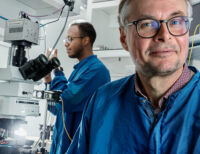Friday 28 May 21
More than 100 different companies, cluster organizations, and knowledge institutions have joined forces to outline a path for the development of the green fuels of tomorrow.
The Danish Centre for Energy Storage (DaCES), six universities, Energy Cluster Denmark (ECD), and Maritime & Logistics Innovation Denmark (MARLOG) have taken the initiative to gather a broad partnership that has prepared a roadmap for how Denmark’s heavy goods transport and energy-intensive industrial companies can be converted to green fuels by 2030 and 2050, while creating jobs, exports, and growth of green technologies.
In total, more than 100 organizations—including GTS Institutes, cluster organizations, and a wide range of relevant companies—have participated in an intensive process, which has now resulted in a proposal for how we solve one of the biggest challenges of the green transition: Phasing out fossil fuels in—among other industries—shipping, heavy goods road transport, aviation, and the maritime shipping industry.
Productive partnership
Chairman of the working group behind the roadmap, Anker Degn Jensen, Professor at the Department of Chemical Engineering at DTU, is pleased that they have succeeded in bringing together so many players in a good and productive partnership:
“Preparing a roadmap for a total transition to green fuels for heavy goods transport and industry has been exciting and complex work, and I would like to thank everyone for all the important contributions we’ve received from companies, universities, trade associations, cluster organizations, and GTSs,” says Anker Degn Jensen.
“Fortunately, we have leading companies that have come far with the necessary technologies, with the possibility of establishing demonstration plants for green fuels in a relatively short period. In the short term, research must also be conducted into, for example, new business models and types of financing, as well as into a more holistic energy system that includes power-to-X production. Finally, research must be conducted into life cycle analyses to ensure that the chosen solutions are genuinely green. And—in the long term—the focus must be on the development of brand-new and more efficient processes for production, storage, and conversion of green fuels.”
Renewable energy
Also Energy Cluster Denmark—which represents the energy sector as a whole—welcomes the collaboration and sees good opportunities for industrialization and upscaling of the technologies within a short time frame:
“Denmark’s energy system has the highest share of renewable energy in the world, and Danish companies are among the absolute leaders in this field. We have all the prerequisites for combining the world’s strongest energy system with technology-leading companies and create the next technological landmark in Power-to-X and green fuels. We know the technologies. The next step is commercial upscaling, large-scale demonstration projects, and the creation of new value chains targeted at transport sector customers that are eagerly awaiting the solutions we can supply,” says Glenda Napier, CEO of Energy Cluster Denmark.
Great potential
Among obvious customers are heavy goods road transport and shipping, where direct electrification is not currently a realistic option. The maritime cluster organization MARLOG sees a great potential for the new technologies and fuels contributing to making shipping and transport by land greener:
“Although shipping is the most energy-efficient mode of transport, the international shipping industry is based on fossil fuels and accounts for 2.2 per cent of the world’s total greenhouse gas emissions. As a globally leading nation in renewable energy, Power-to-X technologies, and shipping, we have the perfect basis for developing the sustainable solutions of the future, while also strengthening our companies’ exports and contributing to significant CO2 reductions globally. Furthermore, our strong positions in international aviation and logistics create good opportunities for promoting solutions that span across modes of transport and drastically reduce emissions from the transport sector,” says Jan Boyesen, Senior Project Manager in MARLOG.
Danish Power-to-X initiative
The Danish Centre for Energy Storage hopes that the broad partnership shows that all players are ready to support the Government’s ambitious climate targets, but DaCES also stresses that it is important to get started now:
“In 2021, the Government is to present a political strategy for a Danish Power-to-X initiative. With this roadmap—which brings together the whole value chain across research and industry—we present a strong proposal to the Government of what is required if Denmark is to accelerate its initiatives and actions, and exploit our potential to become a world leader in exporting technologies and solutions globally. But it requires that the Government involves the players and provide supportive funding for research, demonstration, and industrialization. It is also essential to ensure stable framework conditions for developing the market for green fuels. A strategy is urgent, and we’re ready,” says Anne Marie Damgaard, Head of the Secretariat of the Danish Centre for Energy Storage.
Innovation Fund Denmark has requested roadmaps in a total of four areas, all of which are to contribute to Danish research, innovation, and the corporate sector being able to participate in solving the large challenges that are essential in meeting the Government’s climate targets for 2030 and 2050, while also supporting the creation of jobs and exports. In addition to the roadmap for green fuels, the four so-called ‘Innomissions’ cover topics such as ‘Carbon capture and storage’, ‘Climate-friendly and eco-friendly agriculture and food production’ as well as ‘Recycling and reducing plastic waste and textiles’.
The received roadmaps will provide a framework for Innovation Fund Denmark’s further work to invest DKK 700 million during 2021 in partnerships that can create green results and solutions in the four areas.
















